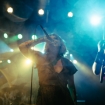"Can we talk about the whole female-fronted thing? Can we really drive that point home — about how much I hate it?"
Emma Boster doesn't mince words. The 26-year-old Dying Wish frontperson just spent an hour telling her life story, explaining the origins of her ferocious metalcore band, and thoughtfully articulating their fiery politics. But as a non-male operating in the overwhelmingly masculine metalcore scene, Boster wanted to take a minute to vent about the reductive categorization of "female-fronted" music.
"When you're congratulating me on being a woman who's a musician, it kind of takes away from the validity of my craft," she says. "I just think it's weird. I wish people would stop doing it."
It's a topic that Boster has been repeatedly forced to confront as Dying Wish's star has risen. They haven't even released a full-length album yet, but the Portland quintet are already one of the tightest and most hyped bands in the latest generation of metallic hardcore upstarts. It doesn't hurt that they've been championed by mosh heavyweights Knocked Loose, but between their hellacious riffs, impactful lyrics and Boster's menacing yet accessible delivery, Dying Wish have all the tools to stand out in the overcrowded scene on their own merits.
The self-described "passionate" Boster grew up in the rural outskirts of Portland, Oregon, and attended a school where, she says, racism, sexism and homophobia ran rampant. As the daughter of a feminist, Boster was indoctrinated with socially progressive attitudes from a young age, and she formed her musical identity through bands like No Doubt and the Cranberries, as well as pop stars such as Avril Lavigne, Hillary Duff and Kelly Clarkson. "Any iconic female at the time I was super into," she says.
Although she always had a great relationship with her mother, Boster says that she had a rough childhood. Her mom had her when she was 19, and they lived with her grandparents for a few years until her mom entered a marriage with a man that eventually turned toxic. "It was a really abusive relationship, so they were married for like 10 years and I haven't spoken to him in 10 years," she says.
Outside of her home life, Boster had built up a tough exterior from dealing with school bullies, bigots, and the underlying realization that she was queer. "I kind of always had a feeling that I wasn't really straight," Boster says. "So I was mad at homophobic and sexist things ... I was kind of angry about nothing and everything at the same time."
Like many angry outcasts, Boster found heavy metal in middle school and was instantly hooked. Throughout the next few years, she consumed everything from Slayer and Iron Maiden to Children of Bodom and Bring Me the Horizon. However, it wasn't until she was 15, when a friend took her to see the vegan powerviolence band Punch at an anarchist bookstore, that the connection between aggressive music, leftist politics and the celebration of marginalized identities finally clicked for her. She knew then she was going to be a hardcore kid.
"It was the first time I ever felt like I really belonged somewhere," she recalls.
Boster had been a dedicated member of her school's choir for many years — in fact, it was the only thing that motivated her to stay in high school. "I had to keep grades so that I could compete and stuff like that." However, her position in the group was the alto anchor, which is a harmony support role. She never liked being a soloist, and that same aversion to being the center of attention kept her from pursuing metal vocals throughout her teens.
Eventually, she decided to give it a shot, and after playing in a short-lived band with some high-school friends, they enlisted a couple more members and regrouped under the name Dying Wish. Their vision was to channel the sound of early 2000s metalcore groups like Bleeding Through, Undying and Killswitch Engage, but with a specific focus on meaningful lyrics. "I've always wanted to make every word that I say count and make everything really important," Boster says.
After putting out a scorching demo in early 2018 and a well-regarded split with Serration later that year, the band got a valuable co-sign in 2019 when Knocked Loose had Boster guest on the song "A Serpent's Touch" from their 2019 record, A Different Shade of Blue. With her decade of experience attending, booking and playing hardcore shows, Boster had been around long enough to know Knocked Loose personally, but she was floored when they invited her to hop on the record.
"We weren't nearly as close as we are now," Boster recalls. "But they hit us up and were like, 'Hey, we really want to have you on a song.' And I was like, 'Pinch me.'"
A couple months later, Knocked Loose vocalist Bryan Garris returned the favor by joining Dying Wish on their song "Enemies in Red," and then the two bands collaborated on an "Enemies in Blue" shirt earlier this year that served as a benefit tee to raise money for bail funds. For some bands, shoehorning anti-police-brutality messages into their brand might register as shallow opportunism, but to the contrary, Dying Wish are all too aware of that trendy pitfall. Indeed, their 2020 song "Innate Thirst" was written after Boster saw people co-opt the Black Lives Matter movement in Portland for their own selfish reasons. "[It's about] people who see pain and suffering as an opportunity for their own personal gain," Boster explains.
She's not speaking from behind a keyboard, but from personal experience on the front lines of her city's protest movement. In the summer of 2020, Portland became the focus of national attention when President Trump ordered the Department of Homeland Security to occupy the streets and intimidate people protesting in support of black lives.

"I went the first day to a protest with flip-flops and shorts and a band tee on," Boster says. "I wore a face mask, but my hair was showing, my tattoos were showing. Then, three weeks later, I'm showing up in total black bloc with goggles and a first aid kit."
Without any tours or social gatherings to distract her, Boster and her bandmates directed all of their energy to the protests. "I think it should be the center of every conversation right now," she says. Naturally, some of that anger translated into Dying Wish's debut album, which they recorded during a month-long stint in New Jersey at the end of the summer and is due out in 2021 via SharpTone Records. Boster promises "ass-beater choruses," more arena-sized parts and awesome breakdowns.
Dying Wish came from the hardcore scene but their heaviness and newfound melodic inclinations make them a metalcore band at heart. While this younger scene doesn't have the same anti-capitalist foundations that hardcore was built on, Boster and her bandmates are bringing their left-wing ideologies along with them.
"There's a lot of awareness that needs to happen," she says. "I'm happy to have conversations and make people aware and it's probably going to piss people off — and that's fine, too."












